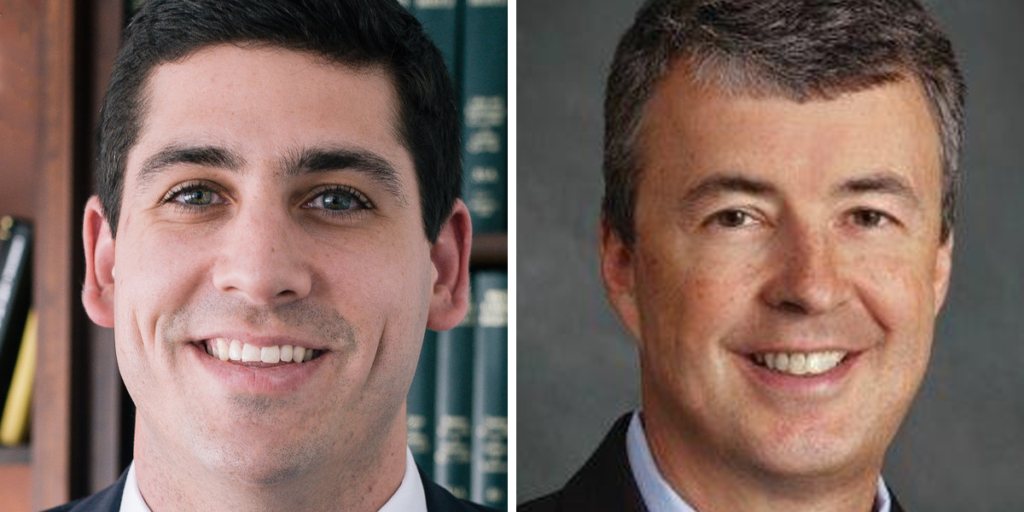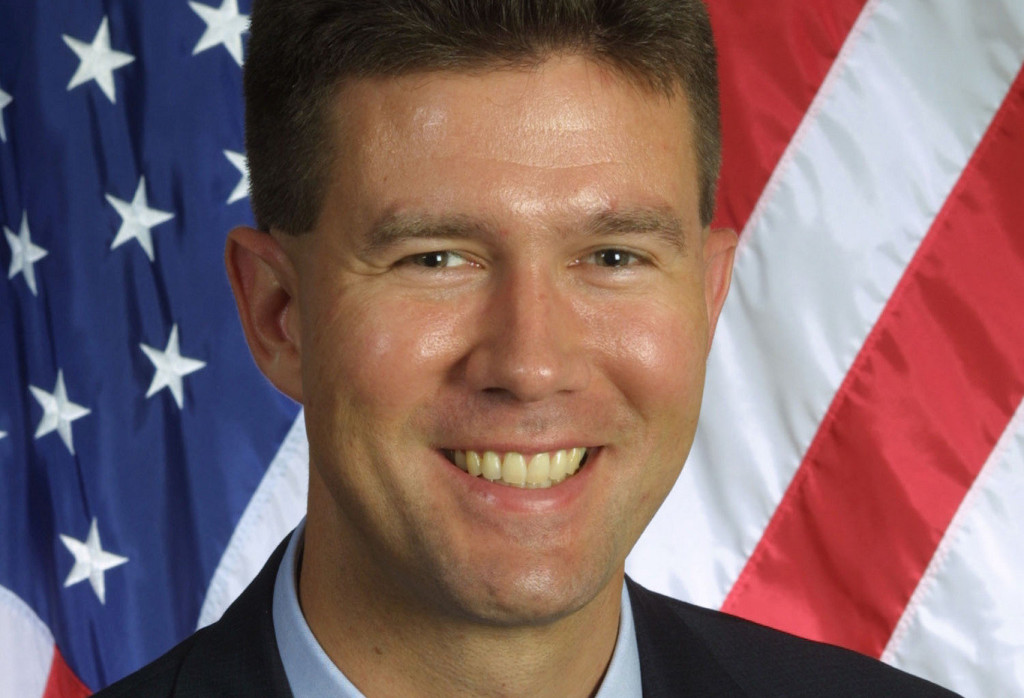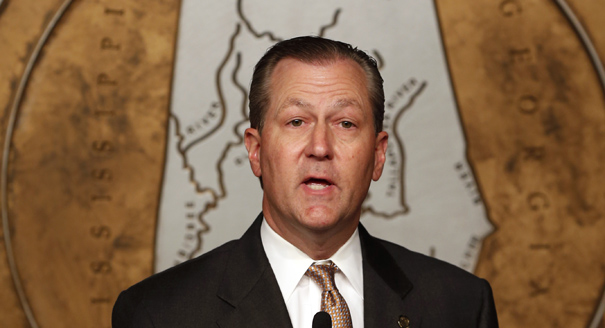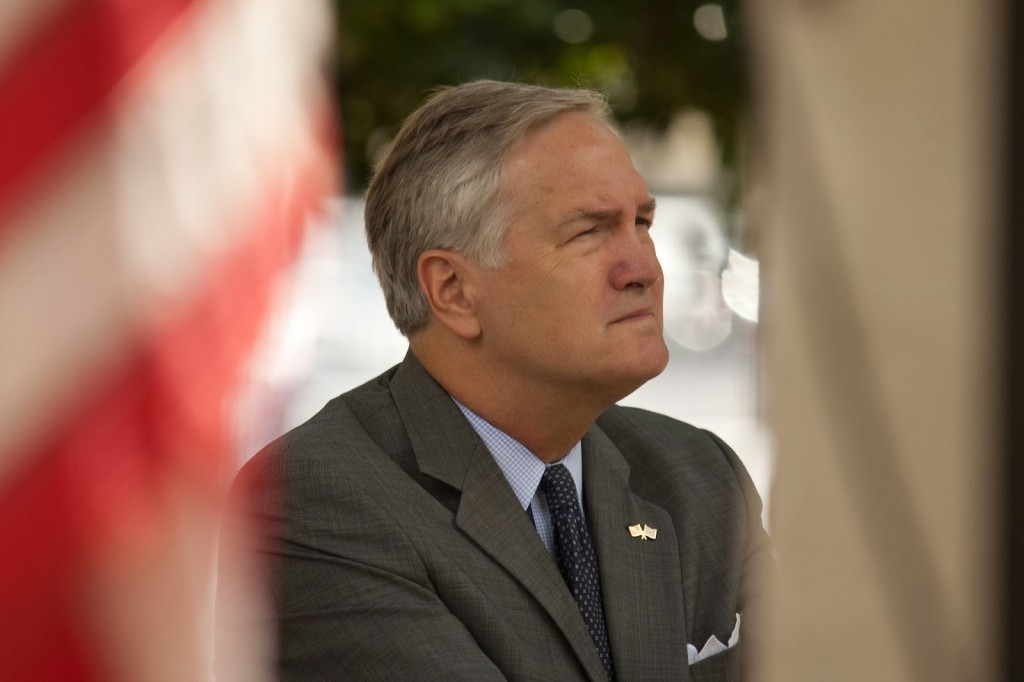Rauf Bolden: Many questions remain on Mayor Tony Kennons’s “work” boat outing

Rauf Bolden thinks the mayor of Orange Beach exposed the city to an unnecessary liability and violated ethics laws in the process.
Joe Siegelman wants Ethics Commission to act on complaint against AG Steve Marshall

Democratic Attorney General Candidate Joe Siegelman held a press conference in Huntsville, Ala. on Thursday to urge the Alabama Ethics Commission to act on the ethics complaint filed against Attorney General Steve Marshall, that they have yet to take action on. The complaint alleges Marshall accepted $735,000 in illegal contributions from the Republican Attorneys General Association (RAGA) Action Fund. The actual complaint was filed back in July by Marshall’s Republican primary opponent, former state Attorney General Troy King. King alleged Marshall accepted the money from the RAGA political action committee and said that the group uses money from other PAC’s to fund their own PAC; violating Alabama’s PAC to PAC money laws. Siegelman’s press conference followed a letter that Siegelman sent to the members of the Alabama Ethics Commission earlier Thursday morning. “In less than three years, Alabama has lost the highest officeholder in every branch of its government due to unethical or illegal conduct. Now we may lose our Attorney General simply over greed for special-interest, dark money,” said Siegelman. “We face not only losing another high officeholder to illegality, but we face a crossroads of whether we are capable and willing to hold the chief law enforcement officer of the State accountable, or allow him to reside above the law.” Marshall’s campaign reacted to Siegelman’s press conference saying, “It is unfortunate that our young, inexperienced liberal democratic opponent has decided to run a false and negative campaign.” To which Siegelman replied, “My opponent criticizes me for being young. I may only be 30, but I know better than to accept $735,000 in illegal contributions. He sadly does not. Notably my opponent chose to attack me rather than respond to the allegations, which were made by a fellow Republican.” Read Siegelman’s letter to the Ethics Commission below:
John Merrill: The people of Alabama need an Ethics Commission that will enforce the laws

I am disappointed to find myself, once again, in a position to ask what purpose the Alabama Ethics Commission serves to the people of this state. To whom are the elected officials or those seeking public office to look to for ethical political leadership? The people of Alabama need an Ethics Commission that will enforce the laws and regulations it is charged with enforcing, with consistency. When campaigns file their fundraising disclosures with the Secretary of State’s office, they are required to file on a given date no later than 11:59 p.m. When candidates and political action committees (PACs) fail to file these reports in a timely manner, the law requires the Secretary of State’s Office to issue a civil penalty based on the amount of contributions and expenditures from that reporting period. In the event that a candidate or PAC wishes to appeal the penalty, the Secretary of State’s office is required to send those requests to the Alabama Ethics Commission, allowing members of the Commission to determine whether the penalty should be upheld or not. At three previous Ethics Commission meetings, in February, April and June of 2018, the commission waived fines on 12 appeals that were filed outside the 14-day window allowed by law. However, during the Commission’s meeting on Sept. 5, they declined to hear cases filed outside the 14-day window, saying they didn’t have jurisdiction and declining to rule on whether that penalty would stand — despite having previously done so previously 12 times in 2018. It the position of the Secretary of State’s Office that these specific matters were improperly set aside and should be reinstated by the Commission. And, in spite of a request from counsel for the Ethics Commission, the Secretary of State’s Office will continue to adhere to the requirements of state law which clearly establishes the Commission as the sole body with authority to overturn a penalty issued for a campaign or political action committee filing a financial disclosure form after the due date. Previously, Ethics Commission Executive Director Tom Albritton stated, “the commissioners reviewed those files and discussed them in detail before our meeting. So they reviewed every one of them as they have for every meeting.” If that is true, then why have they just now become aware of these appeal date issues? Each appeal delivered to the Alabama Ethics Commission is delivered as a file which includes each file that was not timely filed and a copy of the date the appeal was filed. The Code of Alabama directs the Secretary of State’s Office to work in conjunction with the Alabama Ethics Commission to administer the Fair Campaign Practices Act. Therefore, without communication and cooperation between our agencies, as well as the commission’s consistent application of the laws and rules established by the legislature, the FCPA does not work. ••• John Merrill is the Secretary of State of Alabama, a position which he has held since 2015. He is a member of the Republican Party.
John Merrill announces 92 percent of Alabama election complaints closed

Alabama Secretary of State John Merrill announced on Tuesday that his office has successfully resolved all election complaints from the 2016 election cycle and the 2017 Senate election. Since taking office, Merrill’s team has closed over 92 percent of election issues and complaints that have been submitted. “Our goal since taking office has been to make it easy to vote and hard to cheat,” Merrill said in a press release. “When I first sought this office, there was no process for documenting voter fraud reports. It is unfortunate complaints like this have to be made at all, but I am proud of the way we have worked to follow through and get them closed or reported to the appropriate authorities.” In March of 2015, former Alabama Attorney General Luther Strange and the Alabama Law Enforcement Agency partnered with the Secretary of State’s office to form the Alabama Elections Fairness Project; a united effort to “investigate and prosecute allegations of voter fraud or campaign finance irregularities,” according to AL.com. The team has since created a page on the Secretary of State’s website where concerned individuals can report suspected fraud or suspected violations of the Alabama Fair Campaign Practices Act in state and local elections online. Since April of 2015, Merrill’s office has received 764 complaints about voting issues from several sources, including personally observed voting fraud. Of the 764 complaints received, the office has only 58 remaining cases under investigation. The following is a breakdown of which organizations closed the 706 complaints which were resolved: Seven closed reports were handled by Merrill’s office 24 were sent to the ethics commission 37 were reported to the Attorney General 151 were closed due to lack of sufficient information 39 were reported to local or state law enforcement two were withdrawn 446 were closed generally Each member of the Alabama Elections Fairness Project received complaints in accordance with their jurisdiction. For example: complaints sent to the Ethics Commission involved campaign material or finance issues and those sent to the Attorney General’s office were sent because the complaint contained “improper procedures in the administration of the election process, absentee balloting issues or misuse of campaign materials,” according to the press release. “Our office is committed to serving the citizens of Alabama and to doing our part to uphold the rule of law,” Merrill continued in the press release. “We work closely with our law enforcement agencies at the local, state and federal levels to ensure these issues are properly investigated and vigorously prosecuted. We currently have several cases under investigation that could lead to criminal charges, and we hope that serves as a deterrent for people who would seek to harm our electoral process in the future.”
Pamela Cousins, Jefferson County judicial candidate, back on general ballot

A Jefferson County district judge candidate will be reinstated on the November general election ballot, following a ruling by a Montgomery County Circuit Judge on Friday. Pamela Cousins, a Democratic candidate for district judge in Jefferson County was disqualified recently for not filing a Statement of Economic Interests with the Ethics Commission. After learning of her disqualification, Cousins filed a complaint in court according to the Associated Press, explaining she had filed the statement with the Democratic Party and the state Supreme Court, but not the Ethics Commission; but either way it shouldn’t matter. In her complaint, Cousins contends that although she did not file the proper report with the proper entity, she had qualified and run in both the June 5 primary, and the July 17 runoff election without receiving any notification about the failure; and won. Cousins also stated that she promptly filed the correct statement with the Ethics Commission after receiving the notification of her failure. On Friday, Montgomery County Circuit Judge Johnny Hardwick ruled that she followed the spirit and intent of the law, and that she belongs on the ballot. “The Court finds that Plaintiff filed her Statement of Economic Interest with the Alabama Democratic Party and the Alabama Supreme Court. Having done that, Plaintiff complied with the spirit and the intent of the statute in question and acted in good faith,” AL.com reported. “Hardwick also ruled that the Alabama Democratic Executive Committee has the authority to name Cousins as its candidate even if is determined that she had been disqualified because of the failure to file a statement until this week.”
Rauf Bolden: Call for establishing an Ethics Commission in Orange Beach

People rub their eyes at the prospect, having $87 Million on the table for one bridge and $60 Million on the table for another, having $4 Million on the table for a performing arts center and $4 Million on the table for ball fields at the new school, perhaps forming our own Ethics Commission is the least bad option for local oversight, restraining ourselves from an embarrassing scandal, protecting our officials from unwise inclinations, protecting another politician from legal jeopardy. I propose a local ethics commission composed of five volunteers, perhaps lawyers or paralegals from the community, meeting once every three months, providing ethical guidance for officials and employees about their roles interacting with vendors and bidders, accepting gifts like tuna dip at restaurants, VIP tickets for concerts or fishing trips in the Gulf, understanding how lobbying influences the psychology of the Council Chambers. This body would be responsible for opinions from the Alabama Ethics Commission before irreversible mistakes are made. “There isn’t a place in Alabama that contributes more tourism revenue than the cities of Gulf Shores and Orange Beach,” wrote the Mayors in a letter to Lagniappe Mobile, published on 5/16. Their argument is true, bolstering my reasoning for better ethical oversight at the local level, because a lot of money is on the table. Orange Beach took in over $40 Million in revenue last year, according to Mayor Tony Kennon’s State of the City slideshow, given a Lulu’s. “Check our state budgets for the revenue we contribute. Check the studies performed to assess our economic impact to the state,” both Mayors espoused in the Lagniappe. These arguments are meant to convince Montgomery to acquiesce, funding the $87 Million bridge west of the Foley Beach Express, but this bridge will still empty out onto two lanes on Canal Road, perhaps not alleviating traffic, raising the question of motivation for the bridge. Is the Baldwin Bridge meant to put the Foley Beach Express out of business, buying it later for pennies on the dollar? This is an ethical question about the long-term plan, centered on why taxpayer monies should be spent for the bridge, having a local commission responsible for ethical guidance would provide scrupulous professionalism, having leadership, finance and ethics on the same page, because human nature is fickle, seeing an opportunity to peddle a little influence can be irresistible. Financial action is usually based on factual data, but the Mayors hold, “There is no need for additional studies. We’ve listened to the travelers and our residents who must navigate our congested roads,” according to their letter in Lagniappe Mobile. This argues the electorate should have faith in the Mayors’ gut instincts, over well documented studies and due diligence. For me the key solution is obvious, but The Alabama Ethics Commission has not replied to my email for an opinion, outlining how a local municipality would found their own ethics commission. “It’s always amazing how some people can misinterpret the facts,” wrote Mayors Kennon and Robert Craft in a joint letter to Lagniappe Mobile, assuming this was their opening premise. The Mayors also argue, “Those few who oppose it [the new bridge} say there haven’t been enough studies and that it hasn’t been proven to be in the public interest.” Yet not one single piece of factual data or traffic study was offered to the public, causing Mr. Jim Ziegler, the State’s Auditor to write a letter to ALDOT’s Director John Cooper, seeking clarification. “I have more questions than I do answers about the proposed additional bridge. I hope to solve that with my specific requests for public records,” Alabama State Auditor Jim Zeigler explained on Twitter. Pillow fights on social media and in the local newspapers underline the need for supervision, ensuring an impartial referee, giving rulings on the bridge-selection process, ensuring lobbyists are coloring between the lines, keeping the ethical interests of the residents in balance with the political aspirations of our leaders. I call for additional oversight, during a period when so much money is on the table, assuming the opposition will not replace the incumbents, lacking the scar tissue of office, simply cutting the cards before the deal is dealt may be enough to sustain an ethical balance. ••• Rauf Bolden is retired IT Director at the City of Orange Beach, working as an IT & Web Consultant on the Beach Road. He can be reached at: publisher@velvetillusion.com.
Ethics Commission director says bill weakens ethics law

The director of the state Ethics Commission said a bill before Alabama lawmakers could open up a potentially wide loophole in state ethics law by carving out an exemption for people doing economic development work. “I think it’s a bad bill that weakens the ethics law considerably,” Alabama Ethics Commission Executive Director Tom Albritton said. The House of Representatives on Tuesday approved a bill to exempt economic developers from the definition of lobbyist under the state ethics law. Supporters argued it is needed to help Alabama compete with other states for projects and factories by keeping developers’ activity confidential, but critics said it opens up an exemption in the ethics law that governs interactions with government officials. The bill says that an economic development professional — defined as a person who does full-time economic development work or works part-time and is “precertified” by the Ethics Commission — shall not be considered a lobbyist. “It exempts people from the definition of lobbying when I think most people would agree that what they are doing is in fact lobbying,” Albritton said. “You are also declaring that the other portions of the ethics act related to a lobbyist’s transaction with public officials no longer apply to them. That’s where the problem lies in my view.” He said another danger is that “economic development is “often used as kind of catch all designation for activity that people want to conduct with executive branch agencies, or executive offices or the legislature itself.” “At the end of the day, there’s a good bit of activity that could be argued is economic development,” Albritton said. Alabama Commerce Secretary Greg Canfield, who oversees the state’s industry recruitment efforts, said his department and professional economic developers asked for the legislation because of confusion that began arising in 2015 on whether developers should register as lobbyists. “If we don’t clarify this under the law, professional site consultants are going to draw a big red line around Alabama,” Canfield said. “That red line is going to say avoid bringing projects to the state of Alabama because there are too many states that will, for one, protect the confidentiality of your project and two, not require you go through training and registration on a regular basis. It will be easier to conduct professional economic development activities in these other states,” Canfield said. Rep. Ken Johnson, the bill’s sponsor, said the state should not put a “hurdle” on professional site developers by requiring them to register as lobbyists. Johnson said the five-member Alabama Ethics Commission previously tabled an advisory opinion on the matter so lawmakers could attempt to address the issue. Johnson said he believes lawmakers have prevented it from becoming a wide loophole by specifying that the exemption couldn’t be claimed by legislators, other public officials and people who are otherwise lobbyists. The Alabama Attorney General Steve Marshall said he opposed the bill at first but was pleased with changes to the bill, before its House passage, that he said creates a “narrowly-drawn exemption for full-time economic development professionals.” Albritton said a better way, in his view, would be to keep the developers under the state ethics law, but allow the reports on their activity to remain confidential for a period of time so deals in the making are not publicly disclosed. The bill now moves to the Alabama Senate. Senate President Pro Tem Del Marsh said he wanted to speak with both Marshall’s office and the state ethics commission. “I’m not going to move anything unless the attorney general and the ethics commission are on board with it,” Marsh said. Republished with the permission of the Associated Press.
Former deputy AG testifies for Mike Hubbard defense

A former deputy attorney general testified Monday that a prosecutor bragged he would ruin indicted House Speaker Mike Hubbard politically. Former Deputy Attorney General Sonny Reagan‘s testimony in Lee County Circuit Court was the start of a multi-day pretrial hearing as Hubbard looks to have the corruption case against him dropped. Hubbard faces 23 felony ethics charges accusing him of using his public positions to benefit his businesses. Hubbard has denied any wrongdoing. The Auburn Republican has alleged prejudicial prosecution and has said a 2010 ethics law that he supported is unconstitutional and being incorrectly applied in this case. Reagan spent nearly four hours testifying about the ways in which he found both prosecutor Matt Hart‘s remarks and his handling of grand jury proceedings prejudicial. During the defense’s questioning, Reagan told a judge that Hart was out to ruin Hubbard and made several threats against him during private discussions. “He said he would put a gun in his mouth with his hand on the trigger, show him the indictment and maybe he would plead guilty and resign,” Reagan said. Solicitor General Andrew Brasher suggested that Hart using gruff or suggestive language about the case with Reagan in private wasn’t necessarily an indication of bias since the two both have military backgrounds. Reagan resigned in December after he was accused of trying to undermine the investigation. Attorney General Luther Strange said Reagan communicated with people interested in stopping the probe and used as his personal attorneys two lawyers who were representing defendants. Reagan has denied those allegations. Prosecutors on Monday also presented court documents saying Reagan’s attorney sought to have the grand jury reviewing Hubbard’s case disbanded and advised him to use his Fifth Amendment right during portions of his own grand jury testimony. One of Hubbard’s defense attorneys, Mark White, said he was pleased with the first day of the hearing but declined to elaborate, citing pending testimony from additional witnesses. State prosecutors also are expected to continue questioning Reagan when the hearing resumes Tuesday. White said he also expects to call former Ethics Commission Executive Director Jim Sumner, and former Attorney General’s investigator Gene Sisson. Strange said Sisson helped Reagan secretly tape a conversation with the acting attorney general who was overseeing Hubbard’s case and later lied about losing the recorder. A state board recently upheld Sisson’s firing. The prosecutor, Hart, is also among 40 witnesses on Hubbard’s list. Judge Jacob Walker has said he will determine later whether the defense can take testimony from current Attorney General’s office employees. If so, he said that will be done via deposition. Hubbard’s case is scheduled to go to trial March 28. Prosecutors are objecting to defense efforts to delay the trial, which has already been postponed once. Republished with permission of the Associated Press.
Luther Strange: Ethics commission decision blurs lines between legislators, lobbyists

Alabama Attorney General Luther Strange and state prosecutors have asked the state Ethics Commission to reconsider an advisory opinion that they said could undermine enforcement of state ethics law. Strange and Scott Anderson, president of the Alabama District Attorneys’ Association, sent a Sept. 10 letter asking commissioners to revisit advice given to Rep. Patricia Todd, D-Birmingham, last month. Commissioners said Todd could advocate and vote on bills backed by her employer, an organization that works on gay and lesbian issues, as long as there wasn’t a financial interest involved. Strange said he feared the opinion blurs the lines between legislator and lobbyist. The opinion was cited by Indicted House Speaker Mike Hubbard, R-Auburn, as he seeks to dismiss ethics charges against him. Commissioners in the 4-1 opinion said Todd, may “advocate” for the Lesbian, Gay, Bisexual, and Transgender community, and “may sponsor and vote on legislation affecting the LGBT community while serving as the Director of HRC Alabama, as her advocacy actions will be issue-based and will not provide any personal benefit to herself or her employer.” “After careful review of this opinion, which practically permits an interest group to pay a legislator to lobby the legislature and state and local governments, we find the ethics commission analysis to be fatally flawed and ask the Ethics Commission to withdraw and reconsider this opinion,” Strange and Anderson wrote. Strange said he wanted to be clear that his concern was about the “larger ramifications” and was not an attack on Todd or her employer, the Human Rights Campaign. Todd is the state’s only openly gay legislator, and for years has been one of the most outspoken advocates on gay and lesbian issues. She took the job with the Human Rights Campaign this year. The opinion has become a focal point in the Hubbard case. The powerful Republican faces 23 felony ethics charges accusing him of using his public offices to benefit his businesses and clients. One of the charges against Hubbard accuses him of voting on budget language that could have benefited a client. The 2013 budget approved by the House included language that set out the requirements for a pharmacy benefit manager if the Alabama Medicaid Agency ever decided to hire a company to handle prescriptions. The Bessemer-based American Pharmacy Cooperative, Inc. — which was a client of Hubbard’s — was the only group that met the requirements, according to prosecutors. The state Medicaid agency did not ask for that language, and only one company would qualify under the language — the Bessemer company — State Health Officer Don Williamson said last year. Hubbard’s defense argued that he did not have a conflict of interest because he was being paid to promote the company in the state and that any gain to APCI was “theoretical.” His defense also disputed that APCI was the only qualified company. Ethics Commission Director Tom Albritton said he will present the attorney general’s request for reconsideration to the commission next month. “We are always concerned about getting the answer right, and for that reason value the input of all those affected by the Act which certainly includes the Office of the Attorney General and the state’s District Attorneys. Albritton also noted however, that “Rep. Todd specifically stated in her request that she would not lobby state officials.” Republished with permission of the Associated Press.


